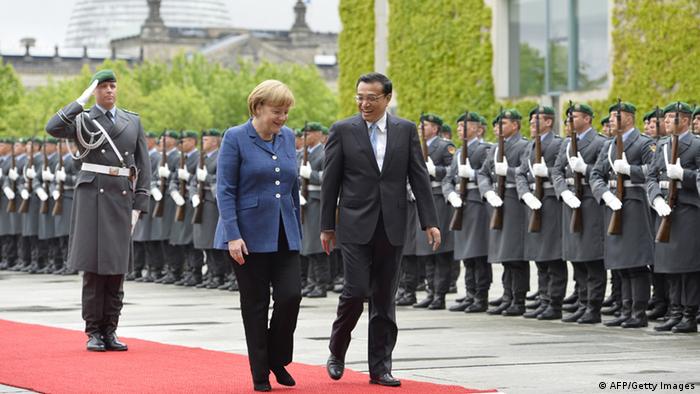China's new premier Li Keqiang has been welcomed to Germany's capital by Chancellor Angela Merkel. She is under pressure from Europe's struggling solar panel branch to stop alleged price-dumping by Chinese manufacturers.
Chancellor Angela Merkel welcomed Premier Li Keqiang with military honors at her Berlin chancellery on Sunday. Germany is the only member of the 27-nation European Union to be visited by Li on his maiden foreign trip, which began last week in India.
Li had sharply criticized the European Commission - while visiting Switzerland on Friday - over its intention to probe China's telecommunications products and impose a 47 percent average tax on imported Chinese solar panels, according to the text of a speech released by China's official news agency Xinhua.
It quoted Li as saying the current EU anti-dumping investigation on solar panels could lead to protectionism.
Merkel on Sunday said "protectionism is no answer." She said that Germany would do its utmost to seek "intensive" talks between the EU and China to avoid permanent tariff strife.
"I respect your stance," she told Li, who replied that China preferred negotiations and hoped that the eurozone nations would soon resolve their financial problems.
This was also important for both Chinese and world-wide developments, Li said.
Growing trade links
Trade between Germany and China reached around 144 billion euros ($185.7 billion) in 2012, according to official German data.
German motor vehicles and auto parts, machinery and electrical goods have a vast export market in China, the world's second-largest economy. China, on the other hand, utilizes technology from Germany. More than half of its solar panel output is exported to Europe.
During their encounter, Chinese and German representatives signed 17 declarations and agreements on bilateral trade projects and German-Chinese cultural ties. China's Confusius Institute, which offers language courses, is to work closer with Germany's 16 regional states or Länder.
Syria also on agenda
Referring to the civil war in Syria, Li said the situation was "very alarming." Li said his government expected that the Syrian government headed by President Bashar al-Assad and Syria's opposition would engage in political dialogue.
During Li's visit to the Berlin chancellery, some 60 protestors assembled outside and demanded that Beijing's new leaders, including Li, change course on Chinese-ruled Tibet. Their placards read things like "new leadership - new Tibet policies. end repression."
Historic focus on WWII Potsdam
Visiting Potsdam, east of Berlin earlier on Sunday, Li reiterated China's claim to a group of uninhabited islands in the East China Sea held by Japan.
The Potsdam venue was the Cecilienhof palace, where Soviet, US and British leaders met at the end of World War II to map out post-war Europe and Asia. Their declaration also stipulated areas that defeated Japan should relinquish.
Artist Ai Weiwei highlights breaches
Ahead of Li's visit to Germany, the Chinese dissident Ai Weiwei released a five-minute Internet video in Beijing decrying China's human rights record.
"In the past 60 years there have been innumerable amounts of people who have been killed or sent away from their homes, even tortured to death," said Ai who was convicted by Chinese authorities in 2011 for alleged tax evasion.
Later this year, Ai is one of four artists who is due to represent Germany at the Venice Biennale, one of the biggest events in the global art calendar. He has said he is not able to travel outside China because the authorities have seized his passport.
Prime Minister Li concludes his visit to Germany on Monday by meeting with business leaders and the 94-year-old former German chancellor, Helmut Schmidt. In April Schmidt published his newest book on China entitled "Ein letzter Besuch" ("A final visit").
ipj/pfd (dpa, Reuters, AFP) dw de

Comments